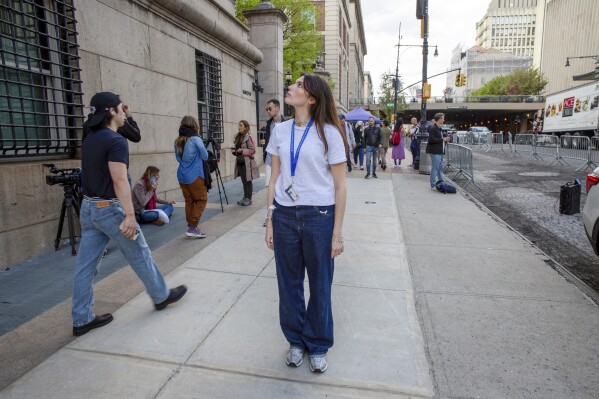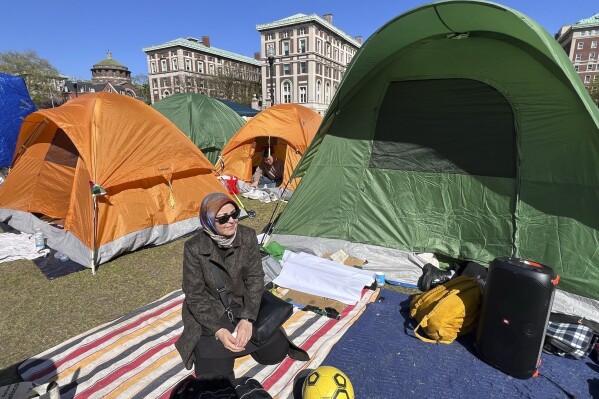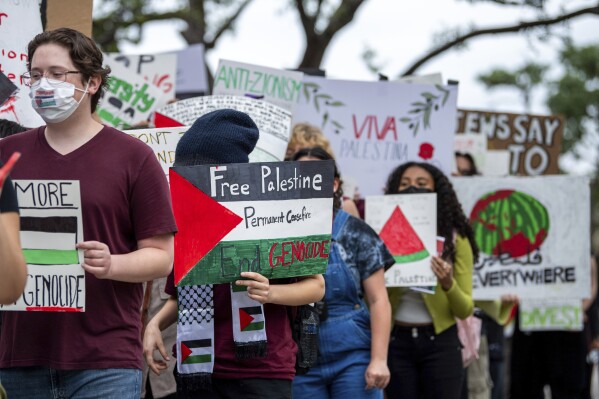Tension grows on UCLA campus as police order dispersal of large pro-Palestinian gathering
LOS ANGELES (AP) — Law enforcement on the UCLA campus donned riot gear Wednesday evening as they ordered the dispersal of over a thousand people who had gathered in support of a pro-Palestinian student encampment, warning over loudspeakers that anyone who refused to leave could face arrest.
A small city sprang up inside the barricaded encampment, full of hundreds of people and tents on the campus quad. Some protesters prayed as the sun set over the campus, while others chanted “we’re not leaving” or passed out goggles and surgical masks. They wore helmets and headscarves, and discussed the best ways to handle pepper spray or tear gas as someone sang over a megaphone.
A few constructed homemade shields out of plywood in case they clashed with police forming skirmish lines elsewhere on the campus.
Meanwhile, a large crowd of students, alumni and neighbors gathered on campus steps outside the tents, sitting as they listened and applauded various speakers and joined in pro-Palestinian chants. A small group of students holding signs and wearing T-shirts in support of Israel and Jewish people demonstrated nearby.
The law enforcement presence and continued warnings stood in contrast to the scene that unfolded the night before, when counter-demonstrators attacked the pro-Palestinian encampment, throwing traffic cones, releasing pepper spray and tearing down barriers. Fighting continued for several hours before police stepped in, though no arrests were made. At least 15 protesters suffered injuries, and the tepid response by authorities drew criticism from political leaders as well as Muslim students and advocacy groups.



Ray Wiliani, who lives nearby, said he came to UCLA on Wednesday evening to support the pro-Palestinian demonstrators.
“We need to take a stand for it,” he said. “Enough is enough.”
Elsewhere, police in New Hampshire made arrests and took down tents at Dartmouth College and officers in Oregon came onto the campus at Portland State University as school officials sought to end the occupation of the library that started Monday.
The chaotic scenes at UCLA came just hours after New York police burst into a building occupied by anti-war protesters at Columbia University on Tuesday night, breaking up a demonstration that had paralyzed the school.
An Associated Press tally counted at least 38 times since April 18 where arrests were made at campus protests across the U.S. More than 1,600 people have been arrested at 30 schools.
UCLA Chancellor Gene Block said in a statement that “a group of instigators” perpetrated the previous night’s attack, but he did not provide details about the crowd or why the administration and school police did not act sooner.
“However one feels about the encampment, this attack on our students, faculty and community members was utterly unacceptable,” he said. “It has shaken our campus to its core.”
Block promised a review of the night’s events after California Gov. Gavin Newsom and the Los Angeles mayor denounced the delays.
“The community needs to feel the police are protecting them, not enabling others to harm them,” Rebecca Husaini, chief of staff for the Muslim Public Affairs Council, said in a news conference on the Los Angeles campus later Wednesday, where some Muslim students detailed the overnight events.
Speakers disputed the university’s account that 15 people were injured and one hospitalized, saying the number of people taken to the hospital was higher. One student described needing to go to the hospital after being hit in the head by an object wielded by counter-protesters.
Several students who spoke during the news conference said they had to rely on each other, not the police, for support as they were attacked, and that many in the pro-Palestinian encampment remained peaceful and did not engage with counter-protesters. UCLA canceled classes Wednesday.
Tent encampments of protesters calling on universities to stop doing business with Israel or companies they say support the war in Gaza have spread across campuses nationwide in a student movement unlike any other this century. The ensuing police crackdowns echoed actions decades ago against a much larger protest movement protesting the Vietnam War.
In Madison, a scrum broke out early Wednesday after police with shields removed all but one tent and shoved protesters. Four officers were injured, including a state trooper who was hit in the head with a skateboard, authorities said. Four were charged with battering law enforcement.
This is all playing out in an election year in the U.S., raising questions about whether young voters — who are critical for Democrats — will back President Joe Biden’s reelection effort, given his staunch support of Israel.
In rare instances, university officials and protest leaders struck agreements to restrict the disruption to campus life and upcoming commencement ceremonies.
At Brown University in Rhode Island, administrators agreed to consider a vote to divest from Israel in October — apparently the first U.S. college to agree to such a demand.
The nationwide campus demonstrations began at Columbia on April 17 to protest Israel’s offensive in Gaza, which followed Hamas launching a deadly attack on southern Israel on Oct. 7. Militants killed about 1,200 people, most of them civilians, and took roughly 250 hostages. Vowing to stamp out Hamas, Israel has killed more than 34,000 Palestinians in the Gaza Strip, according to the Health Ministry there.
Israel and its supporters have branded the university protests antisemitic, while Israel’s critics say it uses those allegations to silence opposition. Although some protesters have been caught on camera making antisemitic remarks or violent threats, organizers of the protests, some of whom are Jewish, say it is a peaceful movement aimed at defending Palestinian rights and protesting the war.
Meanwhile, protest encampments elsewhere were cleared by the police, resulting in arrests, or closed up voluntarily at schools across the U.S., including The City College of New York, Fordham University in New York, Portland State in Oregon, Northern Arizona University in Flagstaff, Arizona and Tulane University in New Orleans.
___
Offenhartz and Frederick reported from New York. Associated Press journalists around the country contributed to this report, including John Antczak, Christopher L. Keller, Lisa Baumann, Cedar Attanasio, Jonathan Mattise, Stefanie Dazio, Jae C. Hong, Colleen Long, Karen Matthews, Sarah Brumfield, Carolyn Thompson, Philip Marcelo, Corey Williams and Felicia Fonseca.
Disclaimer: The copyright of this article belongs to the original author. Reposting this article is solely for the purpose of information dissemination and does not constitute any investment advice. If there is any infringement, please contact us immediately. We will make corrections or deletions as necessary. Thank you.






